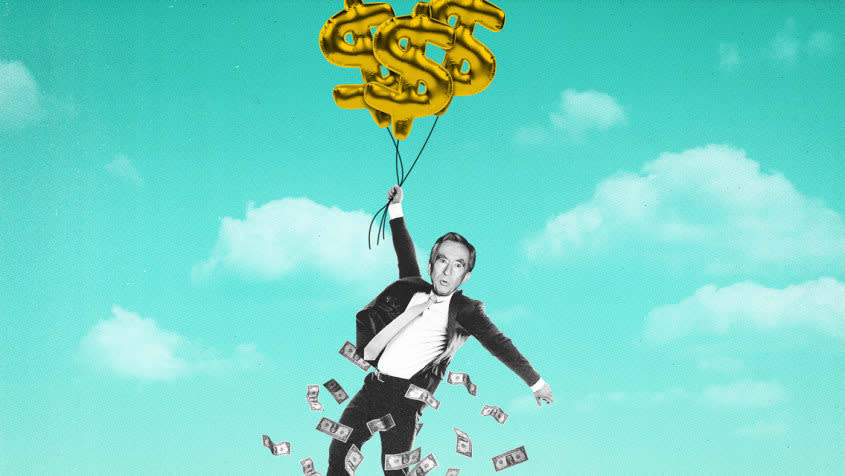A 'wolf in cashmere': How Bernard Arnault became the world's richest person

- Oops!Something went wrong.Please try again later.
Luxury conglomerate LVMH has passed $500 billion in value, becoming the first European company to ever achieve this milestone. While the average person may not know LVMH, they definitely know the brands it owns, including Louis Vuitton, Christian Dior, Hennessy, Moët & Chandon, Givenchy, Princess Yachts, Tiffany & Co., TAG Heuer, and many more.
SEE MORE Are the rich ruining thrifting?
SEE MORE A beginner's guide to passive income
This $500 billion mark cements the status of LVMH's founder, Bernard Arnault, as the world's richest person. Like his company, Arnault is likely not a household name, but Forbes puts his net worth at $243.4 billion. In comparison, the world's second-richest person, Elon Musk, is worth $171.5 billion. Given LVMH's ballooning value, it is likely that Arnault's net worth will only continue to rise.
While French-born Arnault is the face of the operation, his family also shares a sizable portion of this wealth. His daughter Delphine is the CEO of Dior and the vice president of Louis Vuitton, while his son Antoine is Dior's vice-chair. Arnault's other three children also have roles in LVMH-held brands, The New York Times reports, with major positions in Tiffany & Co., TAG Heuer, and Louis Vuitton.
How did Arnault, who is not particularly recognizable outside of luxury circles, make it to the one percent of the one percent?
Arnault's beginnings
Bernard Arnault was born in Roubaix, France, to an industrial family. Described by France24 as a man "driven by ambition who built his own empire," Arnault told the Financial Times his mother had a love of Dior that was passed down to him.
Arnault would eventually study engineering at the École Polytechnique, one of the most prestigious universities in France, Insider reports, before making a small fortune working for his father's construction business. Everything changed for Arnault, though, when he purchased a struggling textile company called Agache-Willot-Boussac in 1984 for $15 million. This company owned a number of French department stores, Insider adds, but also another more notable brand: Christian Dior.
Arnault sold almost all of Agache-Willot-Boussac's other brands to focus on bringing Dior to the top, with The New York Times reporting in the late 1980s that his goal was to create the world's biggest luxury conglomerate. Within a few years, that plan was in motion.
The creation of LVMH and the company's future
After selling off most of Agache-Willot-Boussac, Arnault used the profits to bring together two major luxury brands, Louis Vuitton and Moët Hennessy, with the three companies combining to form LVMH in 1987. Arnault eventually bought a controlling stake in the company in 1989, becoming its principal shareholder.
With LVMH, headlined by Dior, now under his control, Arnault "led an aggressive expansion, turning LVMH into the world's largest luxury goods firm," Forbes reported, slowly acquiring all of the aforementioned brands plus other companies like Loewe, Sephora, Marc Jacobs, and Celine.
Today, the company is by far the largest luxury conglomerate on the planet, controlling more than 70 brands. Its revenues in 2022 totaled $86 billion, according to Forbes. Arnault overtook Musk to become the world's richest person in December of that year. His aggressive acquisitions have earned Arnault both admiration and ire, with The Wall Street Journal noting that many in the industry call him a "wolf in cashmere."
The future for LVMH will likely bring more of the same. Recent reports show that despite the downturn in the economy, the luxury goods market remains resilient. At the end of 2021, Arnault announced that LVHM was looking to recruit nearly 25,000 more young people by the end of 2022.
However, Arnault is 74 years old, so thoughts have inevitably turned to the next generation of LVMH leadership. While all of his children are potentially in the running to lead the company, the Journal reports that his eldest child, Delphine, has seemingly pulled out in front. However, Arnault "has given no indication whom he will choose as his successor, saying only that it will be based on merit," the Journal notes, meaning that he likely still sees himself in the role for the foreseeable future.
You may also like
James Corden hosts his last Late Late Show, with an intervention from fellow late-night hosts

